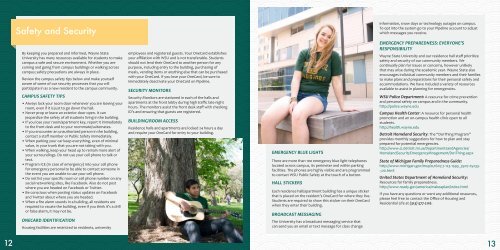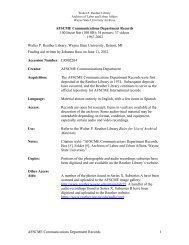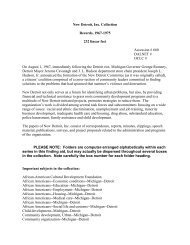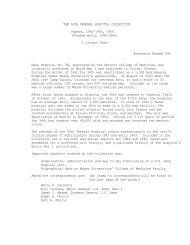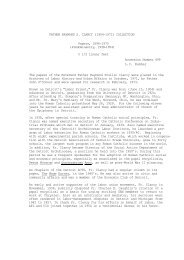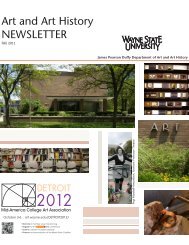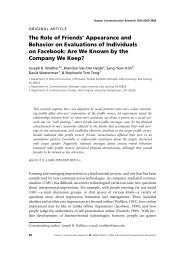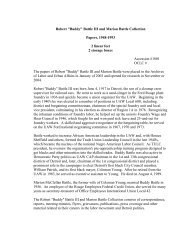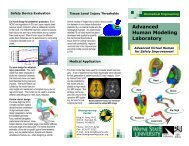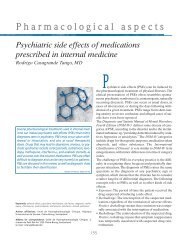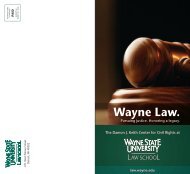Move-In Guide 2012 - Housing - Wayne State University
Move-In Guide 2012 - Housing - Wayne State University
Move-In Guide 2012 - Housing - Wayne State University
Create successful ePaper yourself
Turn your PDF publications into a flip-book with our unique Google optimized e-Paper software.
Safety and Security<br />
By keeping you prepared and informed, <strong>Wayne</strong> <strong>State</strong><br />
<strong>University</strong> has many resources available for students to make<br />
campus a safe and secure environment. Whether you are<br />
coming and going from campus buildings or walking across<br />
campus; safety precautions are always in place.<br />
Review the campus safety tips below and make yourself<br />
aware of some of our security processes that you will<br />
participate in as a new resident to the campus community.<br />
CAMPUS SAFETY TIPS<br />
• Always lock your room door whenever you are leaving your<br />
room, even if it is just to go down the hall.<br />
• Never prop or leave an exterior door open. It can<br />
jeopardize the safety of all students living in the building.<br />
• If you lose your room/apartment key, report it immediately<br />
to the front desk and to your roommate/suitemates.<br />
• If you encounter an unauthorized person in the building,<br />
contact a staff member or Public Safety immediately.<br />
• When parking your car keep everything, even of minimal<br />
value, in your trunk that you are not taking with you.<br />
• When walking, keep your head up to remain more alert of<br />
your surroundings. Do not use your cell phone to talk or<br />
text.<br />
• Program ICE (in case of emergency) into your cell phone<br />
for emergency personal to be able to contact someone in<br />
the event you are unable to use your cell phone.<br />
• Do not list your specific room or cell phone number on any<br />
social networking sites, like Facebook. Also do not post<br />
where you are headed on Facebook or Twitter.<br />
• Be conscious when posting status updates on Facebook<br />
and Twitter about where you are headed.<br />
• When a fire alarm sounds in a building, all residents are<br />
required to vacate the building, even if you think it’s a drill<br />
or false alarm, it may not be.<br />
ONECARD IDENTIFICATION<br />
<strong>Housing</strong> facilities are restricted to residents, university<br />
employees and registered guests. Your OneCard establishes<br />
your affiliation with WSU and is not transferable. Students<br />
should not lend their OneCard to another person for any<br />
purpose, including entry to the building, purchasing of<br />
meals, vending items or anything else that can be purchased<br />
with your OneCard. If you lose your OneCard, be sure to<br />
immediately deactivate your OneCard on Pipeline.<br />
SECURITY MONITORS<br />
Security Monitors are stationed in each of the halls and<br />
apartments at the front lobby during high traffic late night<br />
hours. The monitors assist the front desk staff with checking<br />
ID’s and ensuring that guests are registered.<br />
BUILDING/ROOM ACCESS<br />
Residence halls and apartments are locked 24 hours a day<br />
and require your OneCard for entry to your building.<br />
EMERGENCY BLUE LIGHTS<br />
There are more than 100 emergency blue light telephones<br />
located across campus, its perimeter and within parking<br />
facilities. The phones are highly visible and are programmed<br />
to contact WSU Public Safety at the touch of a button.<br />
HALL STICKERS<br />
Each residence hall/apartment building has a unique sticker<br />
that is placed on the resident’s OneCard for where they live.<br />
Students are required to show this sticker on their OneCard<br />
when they enter their building.<br />
BROADCAST MESSAGING<br />
The <strong>University</strong> has a broadcast messaging service that<br />
can send you an email or text message for class change<br />
information, snow days or technology outages on campus.<br />
To opt into the system go to your Pipeline account to adjust<br />
which messages you receive.<br />
EMERGENCY PREPAREDNESS: EVERYONE’S<br />
RESPONSIBILITY<br />
<strong>Wayne</strong> <strong>State</strong> <strong>University</strong> and our residence hall staff prioritize<br />
safety and security of our community members. We<br />
continually plan for issues or concerns, however unlikely<br />
that may arise during the academic year. <strong>Wayne</strong> <strong>State</strong> also<br />
encourages individual community members and their families<br />
to make plans and preparations for their personal safety and<br />
accommodations. We have included a variety of resources<br />
available to assist in planning for emergencies.<br />
WSU Police Department: A resource for crime prevention<br />
and personal safety on campus and in the community.<br />
http://police.wayne.edu<br />
Campus Health Center: A resource for personal health<br />
promotion and an on-campus health clinic open to all<br />
students.<br />
http://health.wayne.edu<br />
Detroit Homeland Security: The “Do1Thing Program”<br />
provides monthly suggestions for how to plan and stay<br />
prepared for potential emergencies.<br />
http://www.ci.detroit.mi.us/DepartmentsandAgencies/<br />
HomelandSecurityEmergencyMnagement/Do1Thing.aspx<br />
<strong>State</strong> of Michigan Family Preparedness <strong>Guide</strong>:<br />
http://www.michigan.gov/msp/0,1607,7-123-1593_3507-25233-<br />
-,00.html<br />
United <strong>State</strong>s Department of Homeland Security:<br />
Resources for family preparedness.<br />
http://www.ready.gov/america/makeaplan/index.html<br />
If you have any questions or want any additional resources,<br />
please feel free to contact the Office of <strong>Housing</strong> and<br />
Residential Life at (313) 577-2116.<br />
15<br />
16<br />
12 13


